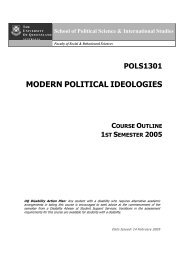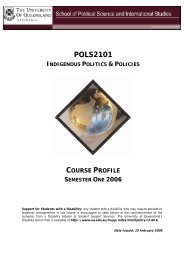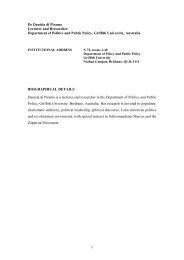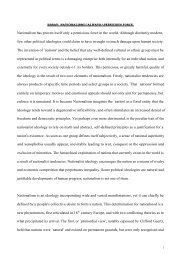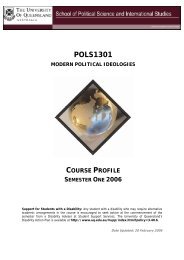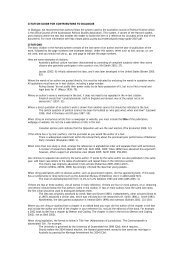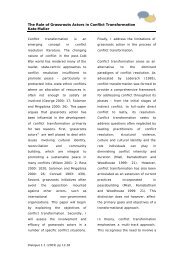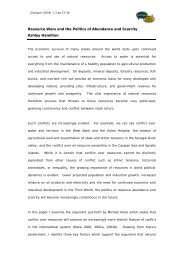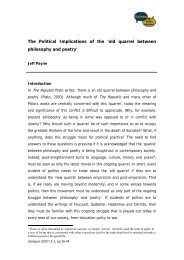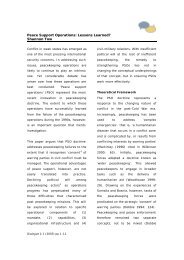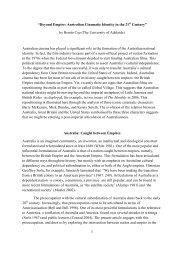Exploring the meaning of free speech with Katharine Gelber
Exploring the meaning of free speech with Katharine Gelber
Exploring the meaning of free speech with Katharine Gelber
Create successful ePaper yourself
Turn your PDF publications into a flip-book with our unique Google optimized e-Paper software.
<strong>Exploring</strong> <strong>the</strong> <strong>meaning</strong> <strong>of</strong> <strong>free</strong> <strong>speech</strong> 42<br />
<strong>of</strong> what it means to be as a human being living in a society, living in a<br />
community. 3) The argument from democracy, also privileges political <strong>speech</strong>:<br />
<strong>the</strong> argument that we need to be able to engage in <strong>speech</strong> in order to self-govern,<br />
and to do that in a democratic way. 4) The argument from self-fulfilment:<br />
engaging in <strong>speech</strong> so that we develop our own individual capacities.<br />
In <strong>free</strong> <strong>speech</strong> literature <strong>the</strong>re’s an assumption that political <strong>speech</strong> ought to be<br />
particularly protected. However, in that same literature <strong>the</strong>re’s very little clear<br />
elucidation <strong>of</strong> what political <strong>speech</strong> is. In my work I have tended to think <strong>of</strong><br />
political <strong>speech</strong> as that <strong>speech</strong> which is facilitative <strong>of</strong> both one’s ability to live<br />
socially and to govern socially - to self-govern, that is, to have a society that is<br />
democratic in which we can participate.<br />
So it helps us; <strong>speech</strong> helps us make democracy happen; <strong>speech</strong> is part <strong>of</strong> making<br />
democracy happen. For us as citizens, <strong>speech</strong> is constitutive <strong>of</strong> what we need to<br />
be able to do to develop our ability to participate in relevant democratic<br />
processes. So at both <strong>the</strong> individual level and <strong>the</strong> social level, political <strong>speech</strong> is<br />
<strong>the</strong> means by which we make democracy happen.<br />
JC<br />
KG:<br />
JC:<br />
KG:<br />
Can I follow up? How do you distinguish political <strong>speech</strong> from o<strong>the</strong>r forms <strong>of</strong><br />
<strong>speech</strong>? Has <strong>the</strong> distinction to do <strong>with</strong> <strong>the</strong> arena in which <strong>speech</strong> takes place? Or<br />
is it about <strong>the</strong> content <strong>of</strong> <strong>the</strong> <strong>speech</strong>?<br />
Again, that is a very good question. But it is not very clearly answerable.<br />
Three types <strong>of</strong> <strong>speech</strong> are set <strong>of</strong>f against <strong>free</strong> <strong>speech</strong>. Commercial <strong>speech</strong> is not<br />
regarded as, or is set <strong>of</strong>f as distinct from political <strong>speech</strong>: even in <strong>the</strong> United<br />
States, commercial <strong>speech</strong> is much more easily regulable than o<strong>the</strong>r types <strong>of</strong><br />
<strong>speech</strong>. Obscenity, particularly pornography, certain types <strong>of</strong> pornographies, is<br />
also set <strong>of</strong>f as distinct from political <strong>speech</strong>. And <strong>the</strong> third one might be artistic<br />
<strong>speech</strong>. But again <strong>the</strong>re’s a blurry line because it depends on <strong>the</strong> kind <strong>of</strong> art you’re<br />
talking about. Some art, which seeks to be a sort <strong>of</strong> expression <strong>of</strong> creativity,<br />
might not be definable as political <strong>speech</strong>. But some art I can think <strong>of</strong> would be<br />
very political.<br />
The distinction you seem to be pointing towards has to do <strong>with</strong> <strong>the</strong> purpose <strong>of</strong> <strong>the</strong><br />
content <strong>of</strong> <strong>the</strong> <strong>speech</strong>. But in your book you discuss <strong>the</strong> use <strong>of</strong> flags and also<br />
certain kinds <strong>of</strong> artistic enterprise as political. Why is it, in particular, that you<br />
see flag use as a form <strong>of</strong> political <strong>speech</strong>?<br />
What I’m interested in is what <strong>speech</strong> does as opposed to trying to define political<br />
<strong>speech</strong> <strong>with</strong> reference to its content, or <strong>with</strong> reference to <strong>the</strong> context in which it’s<br />
spoken, or <strong>with</strong> reference to its audience, or <strong>with</strong> reference to its speaker. I guess<br />
all <strong>of</strong> those things are elements <strong>of</strong> it, but what I’m interested in is what <strong>speech</strong><br />
does.



